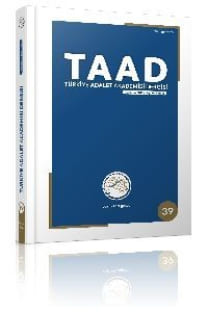AB vatandaşlığının ab içerisinde serbest dolaşım ve ikamet hakkı yönünden temel statü olması
Eu citizenship as the fundamental status for free movement and the right of establishment of nationals of the member states
___
- BİLGİN A. Aslı, Lizbon Antlaşması Sonrası Avrupa Birliği Serbest Dolaşım ve Politikalar, İşçilerin Serbest Dolaşımı, Editörler: Belgin Akçay, Gülüm Bayraktaroğlu Özçelik, Birinci baskı, Seçkin Yayıncılık, Ankara 2010 s.74.
- BOZKURT Enver, ÖZCAN Mehmet, KÖKTAŞ Arif, Avrupa Birliği Hukuku, b.4, Asil Yayın Dağıtım, 2008
- CRAIG Paul & DE BURCA Grainne, EU Law: Texts, Cases and Materials, 4th Edition, Oxford University Press, Oxford, 2008
- CURRIE Samantha, ‘The transformation of Union Citizenship’, 50 years of the European Treaties. Looking Back and Thinking Forward, kitabı içerisinde Samantha Currie ve Michael Dougan (Oxford:Hart) 2009.
- TEZCAN Ercüment, Avrupa Birliği Hukukunda Birey, b. 1, İstanbul 2002. TRIDIMAS Takis, The General Principles of EU Law, b.2, Oxford:Oxford University Press, 2006.
- VAN GERVEN Walter, The European Union: A Polity of States and Peoples, Stanford University Press, California, 2005.
- BAKLACI Pınar & AKINTÜRK Esen, Avrupa Birliği Vatandaşlarının ve Aile Fertlerinin Üye Devlet Ülkelerinde Serbestçe Dolaşımına İlişkin 2004/38 sayılı Direktif Hakkında Genel Bilgilendirme, İzmir Barosu Dergisi, 2007, C. 72 S. 2, s. 122-123.
- BESSON Samantha & UTZINGER André, Introduction: Future Challenges of European Citizenship — Facing a Wide-Open Pandora’s Box, European Law Journal, Cilt: 13, Sayı: 5, 2007, s. 583.
- BRINK, M.J. Van Den, “EU Citizenship and EU Fundamental Rights: Taking EU Citizenship Rights Seriously?, Legal Issues of Economic Integratio, 2012, C.39, Sa.2, s.273-290.
- EDITORIAL Comments, “Two speed European Citizenship? Can the Lisbon Treaty help close the gap?” Common Market Law Review, Sa. 45, s. 1-11, 2008 s.1.
- ELSUWEGE Peter Van, Shifting the boundaries? European Union Citizenship and the scope of application of EU Law, Legal Issues of Economic Integration, 2011, C.38, Sa.3, 263-276, s. 265.
- ELSUWEGE Peter Van, Euroepan Union Citizenship and the Purely Internal Rule Revisited,European Constitutional Law Review, 2011, C.7, s.308-324, s. 319.
- ELSMORE Matthew J. & STARUP Peter, Union Citizenship–Background, Jurisprudence, and Perspective: The Past, Present, and Future of Law and Policy, Yearbook of European Law, Cilt: 26, 2007, s. 63.
- FONTANELLI, Filippo, Genral Principles of the EU and a Glimpse of Solidarity in the Aftermath of Mangold and Küçükdeveci, European Public Law, 2011, C.17, Sa.2, s.225-240.
- GUTH Jessica & MOWLAM Edward, The evolution of European Union citizenship – where does Zambrano take us?, The Law Teacher, C.46, Sa.1 s.75-82.
- KOCHENOV Dimitry, IUS Tractum of many faces, European Citizenship and the difficult relationship between Status and Rights, Columbia Journal of European Law, 2009, C.15, Sa.2, s.212-214.
- LANSBERGEN Anja & MİLLER Nina, European Citizenship Rights in Internal Situations: An Ambiguous Revolution? Decision of 8 March 2011, Case C-34/09 Gerardo Ruiz Zambrano v. Offi ce national de l’emploi (ONEM), European Constitutional Law Review, 2011, C. 7, s. 287–307.
- LENAERTS Koen, European Union Citizenship, National Welfare Systems and Social Solidarity, Jurisprudence, 2011, C. 18, Sa.2, s.397-422.
- OOSTEROM Staples Helen, To What Extent Has Reverse Discrimination Been Reversed? European Journal of Migration and Law, 2012, C. 14 , s. 151– 172, s.155.
- RICHARDS Tom, Zambrano, McCarthy and Dereci: Reading the Leaves of EU Citizenship Jurisprudence, Judicial Review, 2012, C. 17, Sa. 3, s. 272-285.
- RYLAND Diane, “Freedom, Solidarity and Citizenship”, Managerial Law, Cilt: 47, Sa. 6, 2005, s. 176-190.
- SHUIBHNE Niamh Nic, The resilience of EU Market citizenship, Common Market Law Review, C. 47, s. 1597-1628, 2010, s. 1612.
- SPAVENTA Eleanor, Seeing the wood despite the trees? On the scope of Union Citizenship and its contitutional effects, Common Market Law Review, 2008, Sa. 45, s.13-45.
- TOMUSCHAT Christian, ‘Case Note Martínez Sala’, 2000, C. 37 Common Market Law Review, s. 449-457.
- WIESBROCK Anja, Granting Citizenship-related Rights to Third-Country Nationals: An Alternative to the Full Extension of European Union Citizens- hip, European Journal of Migration and Law, 2012, C. 14, s 63–94, s.63.
- ISSN: 1309-6826
- Yayın Aralığı: 4
- Başlangıç: 2010
- Yayıncı: Türkiye Adalet Akademisi
Hakimlerin hesap verebilirliği
Bürokrasi: Monarşiden cumhuriyete değişmeyen iktidar
Türk anayasaları ekseninde Türkiye’de temsil olgusu
Karayolları trafik kanunu kaynaklı kusursuz sorumluluk
İş kazasında işverenin hukuki ve cezai sorumluluğu
4734 Sayılı kamu ihale kanunu’nda öngörülen zorunlu idari başvuru yolları
Ceza mahkemelerince verilen kararlar bakımından bireysel başvuruda başvuru süresi
AB vatandaşlığının ab içerisinde serbest dolaşım ve ikamet hakkı yönünden temel statü olması
